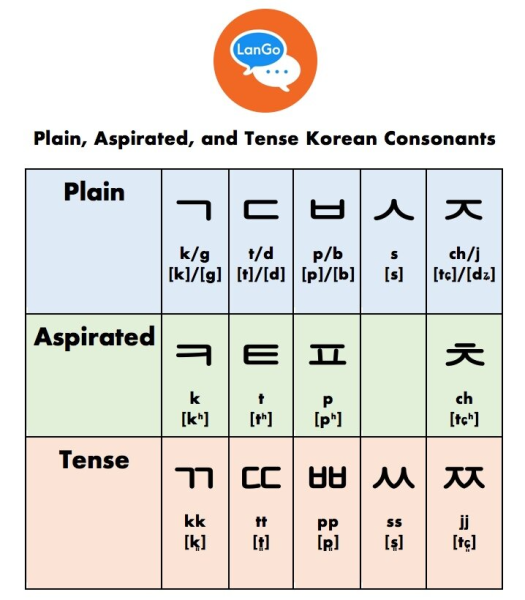If you're learning Korean, understanding aspirated (격음) and tense (경음) consonants can be challenging but crucial. These unique sounds can significantly alter the meaning of words. Here, we’ll explore these consonants using examples from popular K-pop songs and K-dramas to make learning fun and engaging.
What are Korean Aspirated and Tense Consonants?

Aspirated Consonants: The aspirated sounds include ㅋ (k), ㅌ (t), ㅍ (p), and ㅊ (ch). These sounds have a burst of air, like in 카메라 (kamera - “camera”).
Tense Consonants: Tense consonants are ㄲ (kk), ㄸ (tt), ㅃ (pp), ㅆ (ss), and ㅉ (jj). They’re pronounced with a more intense, tighter sound, like in 빨리 (ppalli - “quickly”).
Why Aspirated and Tense Sounds Matter in Korean
Korean consonants are categorized into plain, aspirated, and tense. This classification is important for learners because it can change the meaning of words, and they often appear in everyday speech.
Aspirated Consonants in K-pop
In BTS’s hit song IDOL, the word 칼 (kal - “knife”) has the aspirated consonant ㅋ. You can hear this distinctive sound as they rap about strength and independence. This burst of air is what differentiates aspirated consonants from plain ones.
Tense Consonants in K-dramas
In K-drama Descendants of the Sun, the word 빨리 (ppalli - “quickly”) is frequently used. The tense ㅃ in 빨리 adds urgency, perfect for the high-paced scenes. If you listen closely, you can hear how the tension builds in their speech through the use of tense consonants.
Table of Korean Consonants
| Consonant Type | Korean Character | English Equivalent | Pop Culture Example |
|---|---|---|---|
| Aspirated | ㅋ (k) | Like ‘k’ in “kit” | 칼 in BTS's IDOL |
| Tense | ㄲ (kk) | Like ‘kk’ in “bookkeeper” | 꼬리 in EXO’s Wolf |
How to Practice Korean Aspirated and Tense Consonants
1. Watch K-pop Videos: Pay attention to lyrics with ㅋ, ㅌ, ㅍ, and ㅊ sounds. Notice the burst of air in words like 카페 (kafe - “cafe”).
2. Study K-drama Dialogues: Watch shows on Netflix or Viki and repeat phrases with tense sounds like 빵 (ppang - “bread”).
By using familiar K-pop and K-drama content, you can make learning Korean aspirated and tense consonants an enjoyable experience. Whether you’re singing along to BTS or watching your favorite drama, these sounds will soon become second nature.

